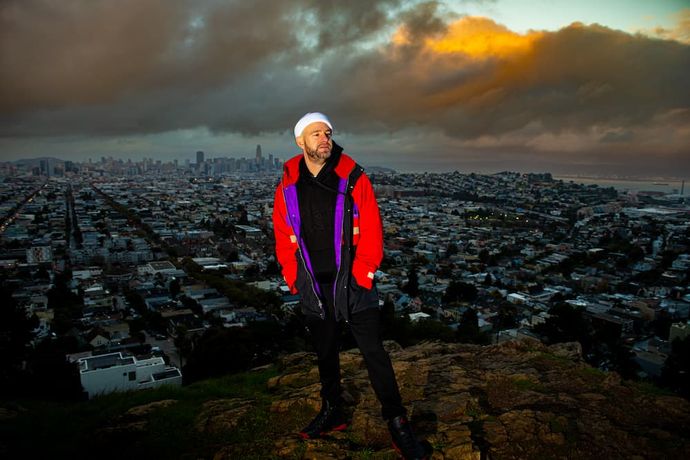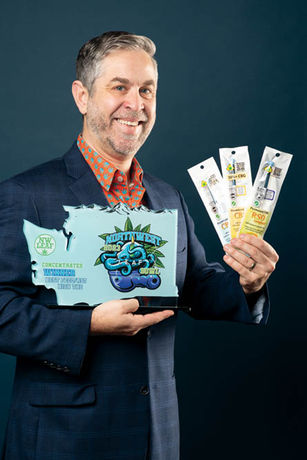A lifelong member of the Southern Humboldt community, Garberville-born Chris Anderson owns and operates Redwood Roots Family, a first-mile distributor that gathers small Northern California farmers under its banner and brings them to market statewide. We connected with Anderson, a true Stoner Owner, to discuss his history with the plant and his thoughts on the past, present and future of the community he loves.
Tell us about your history with the plant.
I’ve been surrounded by it my whole life, and spent a lot of time in this community. It was truly like being raised village style, where everybody’s parents were everybody’s parents. There was a lot of couch surfing … I spent a lot of time at friends’ houses, just completely immersed. (Cannabis) was flying overhead at all times, flying over the school ballfields, being hung by helicopter nets and burnt on the airport runways about 100 yards from my bus stop as a third grader … entire runways of airports being covered in weed plants that were chopped down and eradicated by C.A.M.P. (Campaign Against Marijuana Planting), being lit on fire in broad daylight. It’s just been a part of my life for as long as I can remember on that level. But my intimate, personal experience with Cannabis, and my desire to crack my first seed and smoke my first bowl of shake – because I stole some shake from my dad to smoke my first bowl – was at age 12, and I cracked my first seed at the age of 15. … It’s provided a livelihood and a massive abundance of relationships that are lifelong, whether they’re from childhood, or another farmer I met in 2016 at the Emerald Cup. It’s really been a conduit for relationships and spiritual health and wellbeing, and time with my friends camping, relaxing after work, relieving some pain from a ball game or a soccer game, or helping me sleep. … It’s always been a way of life, and a part of my DNA and this community’s DNA.
What does ‘legacy’ mean to you?
Legacy, to me, means people who have spent a life in Cannabis, or their family has spent a life in Cannabis. People who have experienced the rule of law, the War on Drugs, and have had trials and tribulations of hiding from helicopters or law enforcement, or lying about who they were and their livelihood. People who have been passionate advocates. Maybe not even necessarily cultivators, but who have used Cannabis, and have believed in the medicinal value and have advocated for that for a long time. … It’s about that dedication to the plant, dedication to the community, and truly living that life in Cannabis. Legacy farmers are people who grew up holding hoses, and learned how to grow guerilla weed from their parents. That’s legacy. People who’ve spent time in prison, they’re legacy. People who have had family members or loved ones incarcerated, injured physically, or murdered, for example – I have friends who have been murdered over the plant … that’s our legacy. Giving back to the community, that’s our legacy. Really, it’s people who have dedicated their lives to the plant.
How has your relationship with Cannabis changed over the years?
Since the first time I smoked, I’ve enjoyed it recreationally and medicinally. My relationship with Cannabis has evolved. I think for me now, today, it’s as much about outward facing relationships as much as inward, and evolving and being present through this era of regulated Cannabis, coming from the old ways. I still just love pot. I love the herb. I love smoking it. I love sharing it. I love giving it away. I love growing it. I love packaging it and selling it. I love the fact that there’s newfound energy toward the science and medicinal value of it.
What’s changed about the California Cannabis community since you’ve been a part of it?
Well, Prop 64 changed everything, for the worse, by far. There’s a lot of new people who I think are just encroaching, and just trying to be culture vultures, and poach the identity of this community that has sacrificed its life and its livelihood for generations. … I feel like the herb is being exploited by this money machine that’s all about bottom line and margin, and not about the evolution of the medicine, perhaps, for a lot of people. That’s a tough pill to swallow. … I always wanted the herb to just be free. I didn’t want regulations, even to the detriment of my livelihood. I would prefer to be bussing tables, and have there be free herb everywhere. Deregulated. Not regulated. Completely legalized. That’s what I dreamt of when I was a kid. I didn’t dream of a regulated industry. … The plant itself has not changed. It’s still here, being its wild and free self.
What would you change about the Cannabis industry?
I would go back to the Prop 215 era, and make sure Prop 64 never resurfaced, ever again. Prop 64 has sold legacy and small, rural communities down the stream. Small farmers have been the absolute backbone and breadwinners for small rural communities across Northern California for generations. The fact that Prop 64 was drafted by big money and lobbyists under the guise of giving small, legacy farmers the chance to establish themselves until 2023 – I saw right through that. It was written to be amended. And it wasn’t written to be amended for us. It was written to be amended by drafters, and the lobbyists for big businesses. So the first thing they axed was the one-acre cap. So now there’s a massive oversupply. If they would have limited it to one-acre farms or smaller, there would not be an oversupply today, and small farmers would have an opportunity to build their brands through 2023 – and have a strong foundation beneath them.
What do you love about Cannabis and working in Cannabis?
I love the relationships that the herb has gifted me – by far, it’s the best part. Having conversations with likeminded people










